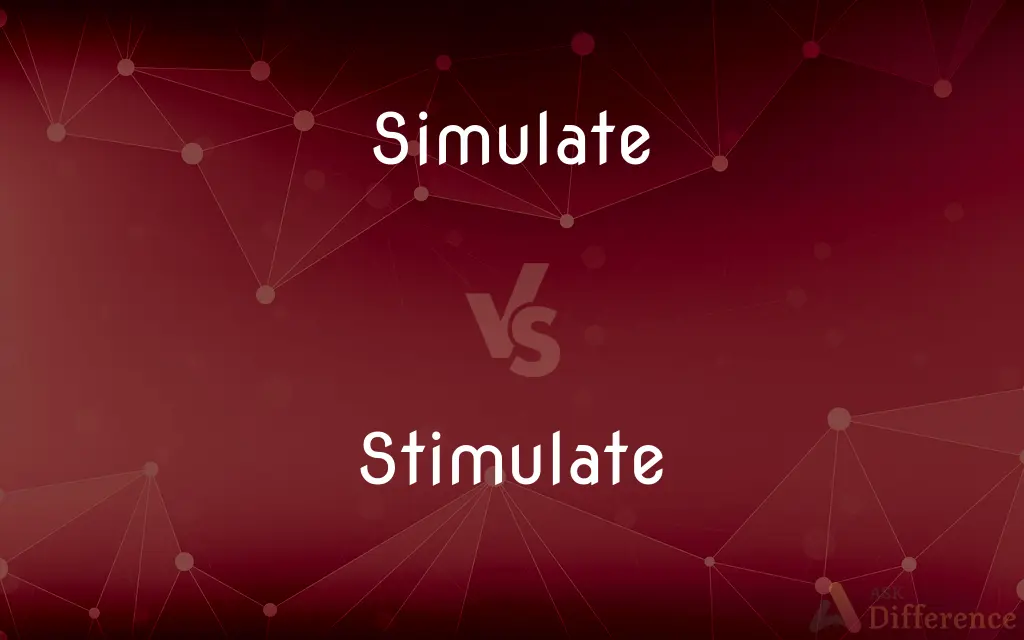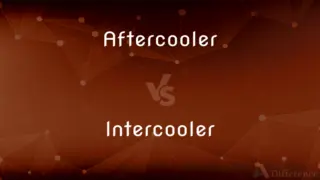Simulate vs. Stimulate — What's the Difference?
By Fiza Rafique & Urooj Arif — Updated on March 24, 2024
Simulate involves creating a model or imitation of a system, while stimulate means to encourage or provoke a response or activity.

Difference Between Simulate and Stimulate
Table of Contents
ADVERTISEMENT
Key Differences
Simulate means to create a representation or model of a real-world process, system, or environment, often using computers, to study its behavior under various conditions. This is widely used in fields such as aviation for pilot training, in engineering for system design, and in video games for creating realistic scenarios. On the other hand, stimulate refers to the act of encouraging or provoking a certain response, activity, or growth. It can be applied in biological contexts, like stimulating nerve cells, in economic policies to stimulate growth, or in educational methods to stimulate learning.
Simulating is a technical process that requires data and models to create a virtual environment where hypothetical situations can be tested without real-world risks. This approach is crucial for safety testing, research, and development in numerous scientific and engineering disciplines. Stimulating, whereas, involves actions or interventions designed to prompt a desired reaction, whether it's physiological, psychological, economic, or social.
While simulation is primarily a methodical and technical tool for analysis and education, stimulation encompasses a broader range of applications from medicine to economics, focusing on inducing desired outcomes or behaviors. For instance, simulating a hurricane's path helps in disaster preparedness, while stimulating the economy through fiscal policy aims to increase employment and consumer spending.
The outcomes of simulation are typically observations, data, and insights into how a system functions or might respond to different conditions. In contrast, the outcomes of stimulation are changes in behavior, activity levels, or growth patterns, depending on the context, such as increased learning retention or accelerated economic recovery.
Despite their differences, both simulation and stimulation are integral to advancing understanding and efficacy in their respective fields. Simulation provides a safe and controlled environment for testing and exploration, while stimulation aims to enhance or alter activities and processes for beneficial outcomes.
ADVERTISEMENT
Comparison Chart
Definition
Creating a model or imitation of a system.
Encouraging or provoking a response.
Purpose
To study behavior under various scenarios.
To provoke or encourage a specific outcome.
Application
Used in training, research, and development.
Used in medicine, education, and economics.
Outcome
Insights and data on system behavior.
Changes in behavior, activity, or growth.
Method
Technical and methodical.
Varied, can be physical, psychological, etc.
Compare with Definitions
Simulate
To represent an action or process in a study or experiment.
Scientists simulate climate change scenarios to study potential impacts.
Stimulate
To encourage or boost a process or activity.
The new policy is designed to stimulate economic growth.
Simulate
To use a computer model for prediction or analysis.
We can simulate the market's reaction to policy changes.
Stimulate
To enhance or improve physiological functions.
Certain drugs are used to stimulate the immune system.
Simulate
To create a likeness or model of a situation or system.
The team used software to simulate the airflow around the car design.
Stimulate
To provoke a response or increase in activity.
Bright colors can stimulate creativity.
Simulate
To imitate the conditions of a process or environment.
Pilots train in simulators that simulate flying conditions.
Stimulate
To promote or accelerate development or growth.
Investment in infrastructure is expected to stimulate job creation.
Simulate
To mimic or reproduce features of a real-world scenario.
Video games simulate real-life experiences with varying degrees of accuracy.
Stimulate
To invigorate or energize a group or individual.
Interactive lessons stimulate student engagement.
Simulate
To have or take on the appearance, sound, or character of; imitate
Music meant to simulate a snowstorm.
Stimulate
Raise levels of physiological or nervous activity in (the body or any biological system)
The women are given fertility drugs to stimulate their ovaries
Simulate
To make in imitation of or as a substitute for
Simulate leather.
Stimulate
To rouse to action or increased activity; excite
A policy that stimulated people to protest.
Incentives to stimulate consumer spending.
Simulate
To make a pretense of; feign
Simulate interest.
Stimulate
To increase temporarily the activity of (a body organ or system, for example).
Simulate
To create a representation or model of (a physical system or particular situation, for example).
Stimulate
To cause to be interested or engaged
Animals in zoos need to be stimulated to remain healthy.
Simulate
To model, replicate, duplicate the behavior, appearance or properties of.
We will use a smoke machine to simulate the fog you will actually encounter.
Stimulate
To excite or invigorate (a person, for example) with a stimulant.
Simulate
(obsolete) Feigned; pretended.
Stimulate
To act or serve as a stimulant or stimulus.
Simulate
Feigned; pretended.
Stimulate
To encourage into action.
Stimulate the economy
Simulate
To assume the mere appearance of, without the reality; to assume the signs or indications of, falsely; to counterfeit; to feign.
The Puritans, even in the depths of the dungeons to which she had sent them, prayed, and with no simulated fervor, that she might be kept from the dagger of the assassin.
Stimulate
To excite as if with a goad; to excite, rouse, or animate, to action or more vigorous exertion by some pungent motive or by persuasion; as, to stimulate one by the hope of reward, or by the prospect of glory.
To excite and stimulate us thereunto.
Simulate
Reproduce someone's behavior or looks;
The mime imitated the passers-by
Children often copy their parents or older siblings
Stimulate
To excite; to irritate; especially, to excite the activity of (a nerve or an irritable muscle), as by electricity.
Simulate
Create a representation or model of;
The pilots are trained in conditions simulating high-altitude flights
Stimulate
Act as a stimulant;
The book stimulated her imagination
This play stimulates
Simulate
Make a pretence of;
She assumed indifference, even though she was seething with anger
He feigned sleep
Stimulate
Cause to do; cause to act in a specified manner;
The ads induced me to buy a VCR
My children finally got me to buy a computer
My wife made me buy a new sofa
Stimulate
Stir the feelings, emotions, or peace of;
These stories shook the community
The civil war shook the country
Stimulate
Cause to be alert and energetic;
Coffee and tea stimulate me
This herbal infusion doesn't stimulate
Stimulate
Cause to occur rapidly;
The infection precipitated a high fever and allergic reactions
Stimulate
Stir feelings in;
Stimulate my appetite
Excite the audience
Stir emotions
Stimulate
Provide the needed stimulus for
Common Curiosities
How is simulation used in education?
Simulation is used to create realistic educational scenarios, allowing students to practice skills in a risk-free environment.
Can stimulation be used in therapy?
Yes, stimulation techniques are often used in various therapies to promote healing and improve physiological functions.
What is the difference between simulating and imagining?
Simulating involves creating a realistic model or representation, while imagining is a purely mental process without physical models.
Can economic stimulation lead to inflation?
Yes, if not carefully managed, stimulating the economy can lead to inflationary pressures.
What does it mean to simulate?
To create a model or imitation of a system or process for study or analysis.
What does it mean to stimulate?
To encourage or provoke a specific response, activity, or growth.
Why is simulation important in research?
It allows researchers to test hypotheses and explore scenarios in a controlled environment without real-world risks.
How does stimulation enhance learning?
By engaging and provoking interest, stimulation improves retention and understanding.
Can stimulation be harmful?
If misapplied, stimulation can lead to undesirable outcomes, such as overstimulation or dependency.
What role does stimulation play in economics?
Stimulation, through policies or investments, aims to encourage economic growth and stability.
Can simulation affect real-life decision-making?
Yes, by providing data and insights into potential outcomes, simulation helps in making informed decisions.
What is an example of a simulation in daily life?
Using a flight simulator app to understand the basics of piloting an airplane.
Is simulation only used in science and engineering?
While common in these fields, simulation is also used in finance, education, and entertainment.
How does stimulation work in the human body?
It can involve physical or chemical methods to provoke responses or enhance functions.
How are simulation and stimulation similar?
Both can be used to predict, improve, or alter outcomes in various fields, although through different means.
Share Your Discovery

Previous Comparison
Aftercooler vs. Intercooler
Next Comparison
Exclusivity vs. ExclusiveAuthor Spotlight
Written by
Fiza RafiqueFiza Rafique is a skilled content writer at AskDifference.com, where she meticulously refines and enhances written pieces. Drawing from her vast editorial expertise, Fiza ensures clarity, accuracy, and precision in every article. Passionate about language, she continually seeks to elevate the quality of content for readers worldwide.
Co-written by
Urooj ArifUrooj is a skilled content writer at Ask Difference, known for her exceptional ability to simplify complex topics into engaging and informative content. With a passion for research and a flair for clear, concise writing, she consistently delivers articles that resonate with our diverse audience.














































